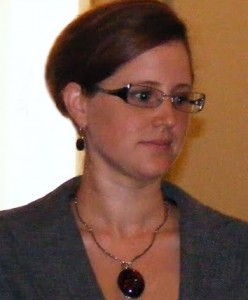Alexandra Zwahlen Tenny, Foreign Service officer and BYU alumna, presented the work she completed during her fourth assignment as a narcotics affairs officer in Bogota, Colombia, where she ran an assistance program for the Colombian Manual Eradication of Coca program in a Kennedy Center lecture on June 9.

Tenny has been with the Foreign Service for 12 years, and in addition to working in Colombia she had been previously assigned to work in Peru, Latvia and Jamaica.
On her desk Tenny keeps a couple of quotes, and one states, “We have met the enemy, and he is us,” which she found off of a comic strip.
“That is to remind me that as the United States government we need to make sure we are not part of the problem, that we are providing solutions and that we can’t want something more than the country itself wants,” Tenny said.
Tenny reminded the students that they can’t push democratic principles until they’re blue in the face if the political buy-in is not there from the countries where they might serve because if it is not there there is no chance for success.
Tenny explains that in her particular bureau, International Narcotics and Law Enforcement (INL), exerting pressure on the narcotics trade, making it less and less advantageous for players to make money, can’t be the only thing that happens.
“What brings stability in a lot of these countries is the rule-of-law side of things. That’s what we call the L in INL. That’s in institutional capacity building and its establishing state presence in state-less areas of these countries, which was particularly important in Colombia,” Tenny said.
Tenny explained that assistance programs, as administered by the USAID, U.S. Agency for International Development, and other development organizations, are key in bringing people out of an informal or an illegal sector into a legitimate sector.
Tenny shared the example of taking the people out of cultivating coca, which is the plant from which cocaine is made.
“But when there are no alternatives for them to provide for their families, a logical human solution is to participate in this trade. There is a lot of money in it, you don’t have to work very hard, and I can grow bananas but I can’t access a significant market, so I’m working harder and making less money. So all of these are very human, logical choices,” Tenny said.
The need to be realistic and providing a stable, secure environment for people to make different choices is important because they have to feel that their families are provided for. When a state is able to do this and provide a rule of law and confidence in government and democratic institutions, then illegal sectors start having a more difficult environment to operate in, Tenny explained.
Ninety-five percent of cocaine in the United States still comes from Colombia. Coca is produced and grown in Colombian and Peruvian regions, and Colombia is still the highest producer of coca leaf but not necessarily of cocaine; that is partly because of the huge eradication effort supported by the INL and the Colombian government.
Two years ago, Tenny headed up a pilot program of eradicating Coca that tested the Colombian civilian political will in some very FARC-controlled areas, which is The Revolutionary Armed Forces of Colombia — People’s Army, a force that receives $3 billion dollars a year from the narcotics trade alone.
The Colombian government offers communities three options for eradication. The first one is spray, which is reserved for dangerous areas where all the coca is controlled by the FARC. Second is the option in which they can voluntarily give it up themselves and receive a support package that is put into place to give them a cushion until the new crops kick in. Then there is forced eradication, where the government will come and take the coca out for them, which the people can request so if the FARC comes through they could claim that they had nothing to do with it.
Tenny told students that doing good and feeling that one is a part of something bigger than oneself is satisfying.
“I believe as a diplomat we are there to serve; we serve our country, we take an oath to defend and uphold the constitution,” Tenny said. “We’re small but we are mighty, and we’re out there in the same places the military is, and we’re just as patriotic.”




